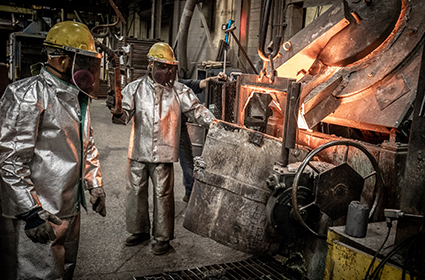First-of-its-Kind Antimicrobial Stainless Steel

Advancing Medical Innovations (AMI) announced earlier this month that its client, Performance Compounds Inside (PCI), has made historic advancements in metallurgy with its 3PRE Technology, a novel and proprietary process of activating antimicrobial properties. PCI’s first use of its 3PRE Technology is with molybdenum, an essential element. This advancement resulted in the first-of-its-kind, antimicrobial stainless steel.
When activated through 3PRE Technology, molybdenum takes on antimicrobial properties and can be added to stainless steel during the foundry process to render it capable of destroying and inhibiting bacteria and other disease-causing microorganisms. The result is a stainless steel that retains the characteristics of 304 and 316 stainless steel while also imbuing antimicrobial properties directly and thoroughly into the steel – not as a coating.
Jim Stachowiak, president & CEO of Stainless Foundry & Engineering said, “Our foundry is pleased to have been involved in the manufacture of the first antimicrobial stainless steel. We are impressed with the homogeneity and consistency of the end product and can anticipate multiple uses across any number of industries.”
Dr. Amod Paranjpe, co-founder and researcher at PCI said, “This is the first time a stainless steel has been manufactured with antimicrobial properties at the foundry process level. Activation of 3PRE within the steel enables a bactericidal effect with an extremely high 24-hour kill rate.” Paranjpe added, “We anticipate this process would be equally effective with any form of steel product.”
3PRE Technology carries significant IP protection and can be used to imbue a range of materials with antimicrobial protection.
Stainless Foundry & Engineering is a manufacturing industry leader in sand & investment castings possessing in house machining, heat treatment, NDT, and various certifications. Pouring over 250 alloys, we primarily work for top sectors as the military, food and dairy, petrochemical, nuclear, power generation, oil & gas, and various pump and valve avenues.
